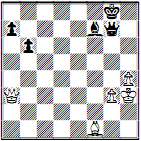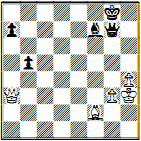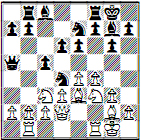| | If you are an average woodpusher or fish like me (under the Expert level), you have experienced from time to time the painful indignity of trying – and failing - to play decently against a master.
The experience goes like this: you play some line, one you think you know fairly well, against the master, and you get through, say, twenty moves in not too bad shape. Then you get just a little uncertain trying to choose between two or three moves, and finally you pick one. Bam! Suddenly the master unleashes some unseen resource from some mystical, unseen part of the board, and the game, which until then was just fine, blows up in your face.
Why does this happen over and over again? Actually, this is the wrong question to ask. It’s not why it happens with a master that’s important, but why it doesn’t happen (as often) with lower-ranked players. We’d find, through analysis of our games against players of all strengths, that often we make similar mistakes repeatedly. Why, then, do we get such distinctively appalling results against masters? For a simple reason: masters know how to punish those mistakes, while other players don’t (or not as often, or not as effectively).
The discovered attack is an excellent tactic to illustrate this principle. A master has a superb chance, to be sure, of spotting a discovery tactic and having the confidence to execute it. Fair enough. But, as the saying goes, “it takes two to make a bully.” Why is the master in position to execute that discovery? Because his opponent has let him!
Now, if we allow a favorable discovered attack to a lower-ranked player, we might (emphasis on might) dodge a bullet, because he might miss it, or might not sufficiently recognize the advantage of playing it, or might be afraid that there’s a refutation he doesn’t see. But with a master? No chance. Provide him such a golden opportunity, and almost assuredly he’ll seize it at once, and the loss will be all our fault.
Why should a discovered attack be blamed on the loser? Look at the following position:

White is to play. Should he play 1. Qxa7? Of course not, you say. Black plays 1. … Be6+ and wins the Queen.
Now whose fault is it for bestowing such a gift on Black? White of course – he moved his Queen from a3, where she was perfectly safe, to a7, a death trap.
But now look at this:

Can White play 1. Qxa7 now? Absolutely! Black’s discovery is meaningless because this time the Queen is safe on a7. The Bishop, if on a7, would also be safe.
What is the difference? In the second position, White’s Queen on a7 is defended. A discovered attack is pointless against defended pieces; it works successfully only on undefended pieces such as the Queen on a7 in the first position.
Now you can see why a player who exposes himself to a discovered attack really has only himself to blame. He digs himself into his own grave with his own careless move – in this case, his own unnecessary placement of a piece on a vulnerable square. And a discovered attack like this is not really that tough to avoid: a player just has to not leave pieces around undefended, especially on concealed attack lines.
Easy enough? Sure, when explained in such facile terms. But what do you suppose happens over the board, between even relatively experienced players? Let’s see two games in which the losing player blatantly violates this seemingly simple principle and is immediately brought to heel.
White: SM Denys Shmelov 2507
Black: Edward Astrachan 2028
Waltham Sukkot G/60
Waltham Chess Club, 9/24/2010
B23 Closed Sicilian
1.e4 c5 2.Nc3 Nc6 3.d3 g6 4.g3 Bg7 5.Bg2 e6 6.f4 d6 7.Nf3 Nge7 8.0-0 0-0 9.Be3 Nd4 10.Rb1
All book in the Closed Sicilian thus far.
10. … Qa5
This move takes the game out of book. 10. … Rb8, preparing …b5-b4, is more usual. The text move has the disadvantage of inviting White’s Queen to come to d2, setting up a potential discovered attack.
11.Qd2
11. a3 is more usual, but White chooses instead to set up the aforementioned discovered attack. If Black plays the most common response 11. … Nec6, defending his Queen, he should be OK.
11. … Rb8
A move too late – Black fails to appreciate the danger in leaving his Queen undefended on a5. White pounces:

12.Nd5
There you have it: Black is obliged to play 12. … Qd8 13. Nxe7+ Qxe7, thereby wasting his Queen foray. Despite some later vicissitudes in the game, White kept the initiative and went on to win.
The Queen left undefended on a5 is a perfect example of a potential victim to a discovered attack – not just because White’s Queen was on d2, but particularly because White had the chance to move his Queen to d2. Although the discovery was minor in this instance and did not end the game, its occurrence alone conceded White a small but lasting edge – all that the master needed.
Now let’s see a case where the discovered attack has immediate effect:
White: Michael Gosselin 1820
Black: SM Denys Shmelov 2507
Waltham Sukkot G/60
Waltham Chess Club, 9/24/2010
C11 French Defense, Steinitz
Variation, Bradford Attack
1.e4 e6 2.d4 d5 3.Nc3 Nf6 4.e5 Nfd7 5.Nf3 c5 6.Be3
Taking the variation out of book. 6. dxc5 is the most usual.
6. … Nc6 7.Be2 cxd4 8.Bxd4 Nxd4 9.Qxd4 Bc5 10.Qg4 0-0 11.0-0 Qe7
Here Black could improve with 11. … Qc7, to put indirect pressure on White’s c-Pawn.
12.Nb5
Risky. 12. Na4, striking at Black’s Bishop, seems a safer bet.
12. …f6 13.Nc7?!
White pushes too far. It’s tempting to fork Black’s Rook and e-Pawn, but White does not observe that he leaves his Knight undefended on an attack line with Black’s Queen. As with the previous game, this is just the concession not to make against a master. Black strikes back with:
13. … Nxe5
Winning a Pawn outright! That was Black’s first step to victory.
One must always take care, then, about leaving pieces loose. If they lie on lines of attack that can be easily cleared, a discovered attack is in the offing. Trust a master to take advantage of it at his earliest opportunity.
These examples should suffice to show that the mistakes we make against masters are often quite elementary. Although we might make comparable mistakes against average players and get away with them, masters, on the other hand, almost always will get us. With few exceptions, masters will see the mistakes and know just what to do to make us feel, once again, like the mere wood-pushers we are.
|